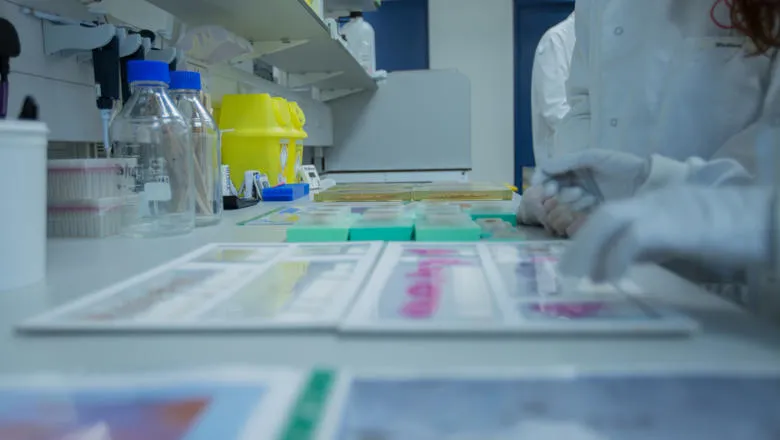“Our goal is to discover meaningful MND treatments within years, not decades. This landmark funding will bring the UK’s major MND research centres together for the first time in a coordinated national effort to find a cure. We now have a much better understanding of MND, so we must take this opportunity to accelerate development of new treatments and work together to move this knowledge into the clinic and help people affected by this devastating disease.”
Professor Ammar Al-Chalabi, co-director of the research programme and Professor of Neurology and Complex Disease Genetics at King’s College London and Director of King’s MND Care and Research Centre
21 June 2022
New £4.25 million grant kick starts UK-wide collaborative research effort to end motor neuron disease
A group of charities and government research organisations has awarded £4.25 million to MND experts at six UK universities to kick start collaborative efforts to end motor neuron disease (MND).

A grant worth £4.25m has been awarded to a new UK-wide MND research partnership, which includes the Insitute of Psychiatry, Psychology & Neuroscience (IoPPN) at King's College London, in the hope to promote the creation of meaningful MND treatments within years, not decades.
The funding was awarded to six UK research insitutions in order to establish a partnership designed to address some of the problems that have hindered the progress of research into a life-altering disease.
Over the course of the next three years, the partnership will pool their expertise to:
- Coordinate research effort and deliver maximum impact for people with MND
- Develop better tests to measure MND progression and that allow doctors to comparedifferent drugs
- Improve MND registers so doctors can collect detailed, high-quality data about the disease,and understand which patients are most likely to respond to a particular drug and thereforerecommend them for the trials most likely to benefit them
- Support people to take part in clinical trials more easily
- Develop more robust lab tests and models of disease to enable scientists to test theoriesabout the disease and a pipeline of potential therapeutic agents that could ultimately beused as MND treatments
The partnership will also launch a major new study involving 1,000 people with MND from across the UK tobetter understand disease progression and how people respond to new and existing treatments.
Professor Christopher McDermott, one of the co-directors of the research programme andProfessor of Translational Neurology at the Sheffield Institute for Translational Neuroscience(SITraN) said, “We believe that by combining and coordinating our expertise, we will be moreeffective than if we work on projects in isolation. This partnership will provide the infrastructure to attract additional MND funding and enable further MND centres and researchers to join forces in thenational effort to find effective treatments for MND. The partnership is the first step towards our goalto establish a national MND institute.”
David Setters, who is living with MND and has been involved in shaping the partnership said, "We welcome this collaboration, which paves the way for the £50 million government investmentpromised in November 2021, focused on making the first meaningful treatments for MND availablewithin years, instead of decades. It brings real hope to those of us living with MND to see ourleading neuroscientists and charities coming together in this way. The prospect of easier access toclinical trials and the most promising therapies being fast-tracked gives us a much-needed boostand brings a real sense of purpose to the community."
Dr Catriona Crombie of LifeArc, the charity which has coordinated efforts from all funders todeliver this landmark MND Collaborative Partnership, said, “Over recent years, scientists havemade great progress in MND, and this has opened up several promising avenues that couldultimately make a difference to patients. But there are some barriers hindering progress. For the firsttime, the MND community – that’s patients, funders, scientists and doctors – have come together towork out the problems and plan a way forward. As funders we are really excited at what thisexceptional group of people could achieve for those affected with MND.”
Health and Social Care Secretary Sajid Javid said, “Motor neuron disease has a devastatingimpact on those who are diagnosed, their families and loved ones – but there is hope. This newpartnership is a highly ambitious approach which will drive progress in MND research and, backedby £1 million of government funding, will bring the MND research community together to work onspeeding up the development of new treatments.The collaboration across government, charities,researchers, industry and people with MND and their families will take us one step closer to one dayachieving a world free from MND.”
The Partnership was formed in 2021 to coordinate and pool funding for research into MND to speedup progress and help research to move towards the clinic and ultimately reach patients faster. Funding for the MND Collaborative Partnership research grant totals £4.25 million and contributionsare as follows: LifeArc (£1 million), MND Association (£1 million), My Name’5 Doddie Foundation(£1 million), MND Scotland (£250,000), Medical Research Council (MRC) (£500,000) and NationalInstitute for Health and Care Research (NIHR) (£500,000).
In May 2022, John Chart, who is lives withing with Motor Neurone Disease (MND) and a clinical trial participant of Dr Jemeen Sreedharan, skydived over Mount Everest to raise awareness about the illness.
For more information, please contact Patrick O'Brien (Senior Media Officer)


